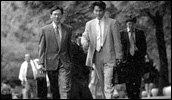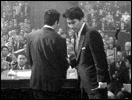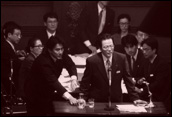Jubaku – Spellbound
- Year
- 1999
- Original title
- Kinyu Fushoku Retto Jubaku
- Japanese title
- 金融腐蝕列島 [呪縛]
- Director
- Cast
- Running time
- 114 minutes
- Published
- 9 March 2009



by Roger Macy
The San Sebastian Film Festival in 2008 fielded a large retrospective of Japanese popular crime films under the banner of 'Japón en Negro'. These films ranged all the way from a 1927 film by Daisuke Ito up to the turn of the millennium. They served as an unbeatable opportunity to see a great range of popular Japanese films, most of them never exhibited in any Spanish-speaking country before and many of them never shown in Europe. It was possible, almost for the first time in one time and place outside of Japan, to take an overview of a segment of Japanese popular cinema. The 43 films selected varied enormously in subject matter, style and any other aspect you might care to consider, and relatively few had any real claims to 'noir' branding, as the organisers readily conceded.
The directors represented in these films ranged from well-known names such as Ozu and Kurosawa to others whose name had hardly figured outside Japan, such as Hideo Suzuki, director of I Saw the Killer. A major discovery for me was a film from a director who would fit neither of these categories, since he is relatively well-known to followers of Midnight Eye. However, although Masato Harada has had a series of successes in Japan, he has enjoyed few theatrical releases in the West. Jubaku - Spellbound was in competition at Berlin in the year of its release, 1999, but has had neither a theatrical showing in the UK, nor any DVD release in the USA or the UK.
This may be about to change. The subject of this film is a real banking scandal in Japan. For the last ten years, we have been able to read any number of accounts, in the financial pages in the west, of how the Japanese banks have crippled their own economy with their undisclosed bad debts. Most journalists writing these reports have not been able to resist a certain level of sermonising, de haut en bas. But Harada only had to revive this film in San Sebastian, for the world's major banks to slide into the mud in the following week, leaving the Japanese banks relatively unscathed.
Harada, of course, could have had little to do with the revival, or its timing, in this festival, although he was there to introduce it in English and to pay due tribute to the supreme director of extras, Akira Kurosawa. Spellbound is itself a film that has ambitious scenes, involving hundreds of extras around some fifty actors. There is also a more intimate scene set in a Japanese inn, which was shot in the ryokan where Kurosawa and his collaborators Shinobu Hashimoto and Hideo Oguni wrote the script of Seven Samurai.
The film is based on a best-selling book by Ryo Takasugi, Kinyu Fushoku Retto. This literally translates as Finance-Corrosion-Archipelago. Takasugi didn't use the usual word for corruption, presumably because he is not alleging that brown envelopes of cash were being passed - they didn't need to. It's a more subtly venal world where success comes from ingenuity in gaining credit, but evading ultimate responsibility for engineering huge loans to companies whose honour may be paper-thin. It's an archipelago because Japan is a group of islands, but also because there is a chain of large and small islands whose power is dependent on an ambiguous chain of command.
Success comes in the form of money and power, and both of these seem to shine most strongly from Hideaki Sasaki (played by Tatsuya Nakadai), eminence grise of the Tokyo commercial bank, within and around which all the action will take place. Harada has taken liberties to create entirely new fictional characters to represent the issues and forces involved, and I think, justifiably. A successful feature film dealing realistically and painstakingly with every detail of the sharp end of big business has never been made and never will be. In business, the big picture and all the detail are both capable of ruining you. Fraud, by its nature, is an intricate misrepresentation of complexity in a constantly changing world. Successful fraudsters have already deceived experienced businessmen before they are discovered. The Serious Fraud Office in the UK has an abysmally low conviction rate, even for those 'stories' it has thought worth taking to court, and the position is just as bad anywhere else around the world. Imagine transposing this to an archipelago where a mere 99% conviction rate (as opposed to the required 99.9%) involves unacceptable loss of face. Stories that baffle juries, despite months of close examination, are hardly going to command the attention of a film audience expecting some entertainment.
But craftsmen have shown that certain truths can be conveyed on film, even when the complexity would be baffling, and a towering example is Akira Kurosawa. Films of his, like High and Low and The Bad Sleep Well, reduce issues to human proportions through human archetypes. Cart-loads of the flotsam of everyday life are cleared away to make a few actions stand out. But what if an essential part of the action is the complexity itself? Then like any ambitious fraudster, you will have to cheat wholesale. I would not claim that Masato Harada is a second Akira Kurosawa, but I do think Harada has helped himself to achieve success by looking hard at the master. Harada has put a few characters stand for many, used a larger cast to place them in a convincing social context and set these in a sea of highly distinguishable extras so that they all are believable individuals. Surprisingly few modern Japanese films seem to attempt this. And Harada believes in pace and action.
Perhaps another way that Harada has learnt from the 'emperor' is in a strong sense of place. The archetypal script meant that Takasugi's extended metaphor of a chain of islands would not carry. After an initial introduction to Takasugi's themes, Harada concentrates on his own geography which revolves around Hibiya Square. Hibiya is very much at the centre of power in Tokyo. Harada places his bank to the south of the square, opposite the media organisation through which he progresses the story. The public prosecutor's office sits to the north, and beyond this lie all the government departments with the Prime Minister's residence to one end and the Diet to the other. Entirely off-stage is the Imperial palace which lies to the east. Certain leitmotivs occur in crossing the square itself. A beggar is repeatedly passed, attempting a tune of Verdi's on the violin. The Nakadai character is also fond of inflicting his rendition of this tune to those who have to pay him court. But the beggar unexpectedly perfects the tune, whereas his eminence never learns.
An obvious elision of character and relationship is that the 'young turk' of the bank is the son-in-law of the Nakadai role, Hiroshi Kitano, played by Koji Yakusho, (who also played the lead in Harada's Kamikaze Taxi and appeared in Bounce Ko Gals). Yakusho's Kitano rapidly finds himself centre-stage in a long struggle to save the bank, both from the Public Prosecutor's office - who have found a mission - and from an old guard who have forgotten what banks were invented to do. The senior management of the bank are up to their eyebrows in dealings that they imagined would always be protected by the deference paid to seniority. Hiroshi Kitano's position in the film is ambiguous and rightly so. A whistle-blower is someone who is forced by conscience and/or circumstance to step from the inside of a tribe to reporting to the outside. Just occasionally a whistleblower has an effect but they will never be thanked by those they save. Yakusho's Kitano never takes this path. He places a marked objection within the camp to some of the loans and, of course, is attacked on the one hand for his unpardonable breach of etiquette, and on the other, for exploiting his family connection. As the Public Prosecutors close in, he first sits mesmerised, but then finds a coalition of those who are prepared to act from within. For each of them it is a step that, ironically, ties them completely to the bank. It will tar them completely as the disloyal, so they will be unemployable elsewhere in the Japanese business community. Their career survival becomes completely dependent on a successful reform of the bank from within.
And, strangely, there is something in the Japanese business ethos that makes self-reform possible, if the power structures are seen to change. The language of work discourse can involve a degree of self-criticism and examination of motives that some westerners find intrusive to their own individuality, especially if, as is normally the case, it seems to be aligned to hierarchies of power which are all too visible. But that same discourse of self-examination can deliver up to a new polity, if the right people have the vision. The reform group sets up structures that not only allow internal reporting of breaches of ethics, but require it. A group of lawyers are engaged to give this action impetus and status. It is gratifying that Harada has a female lawyer in the chief role, but the actor is miscast.
If you are ideologically attuned to think that a bank could never be worth saving, then you may have difficulties with this film. But perhaps this film's reappraisal is timely in a new era where the domino-like consequences of letting the undoubtedly sinful Lehman's bank fail, have been made clear to all.
If the Public Prosecutor's mission was now blunted, the bank's reformers had other enemies to overcome, not least the criminal networks who were the recipients of many of the soft loans, who now started receiving visits from the bailiffs. This reversal of 'property is theft' is not left unchallenged by the mob. Besides sheer physical intimidation, these groups can resort to one of their traditional ploys in Tokyo - the threatened disruption of the shareholders' meeting. A bank under investigation is in no position to pay off the yakuza, even if it wanted to; but in this case, it has to lay itself genuinely open to its faithful shareholders. The shareholders' meeting is a bravura set-piece.
In real life, the media had largely lost interest in the 'story' by then. They had got their closure with the suicide of one of the few individuals who was prepared to take responsibility. Harada's greatest legal difficulty in scripting the film was not in portraying the bank, but in portraying the media, who have the most aggressive lawyers and their own version of the story to protect. It is not altogether surprising that the one media organisation that was prepared to co-operate was one not involved in the story to any degree at all, Bloomberg. Their offices conveniently fitted the geography of the film and Harada opted for a further elision of character by centring on one female reporter who, stretching things surely too far, is also the channel's anchor-woman. But I am probably over-emphasising the condensation of characters. Important ideas spring from the Bloomberg crew, including the cameraman, played by Harada's editor and son, Eugene. And, in fact, there is still a range of characters at the bank that can make it hard to recall all the threads of the plot.
I did get a chance at San Sebastian to speak to Masato Harada and I asked him whether he hadn't portrayed the media too ideally. Harada gets across some of the self-righteousness of the prosecutors but, surely, the media in his film are too selfless? Harada conceded that there were still taboos in Japanese society that he hadn't tackled. But I still haven't seen banking's complexities done better and we should be thankful that Japan has a second draft of history in the can from which we can all learn.